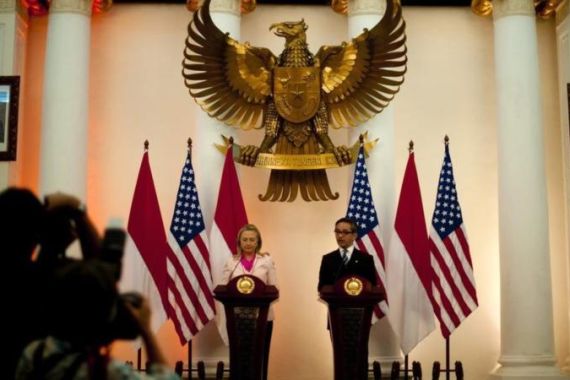Clinton calls for ASEAN unity on S China Sea
US secretary of state cautions against “coercion”, as she urges regional powers to resolve dispute in peaceful manner.

Hillary Clinton has asked Southeast Asian states to present a united front to the Chinese in dealing with territorial disputes in the South China Sea.
Speaking in Jakarta, Indonesia, on Monday, the US secretary of state offered strong US support on Monday for a regionally endorsed plan to ease rising tensions by implementing a code of conduct for all claimants to disputed islands.
She called for those countries and China to make “meaningful progress” towards ending conflicts by November.
She also gave warning against against coercion in the conflict-riven South China Sea and voiced hope that China would find a peaceful resolution to territorial disputes with Southeast Asian nations.
“The United States believes very strongly that no party should take any steps that would increase tensions or do anything that would be viewed as coercive or intimidating to advance their territorial claims,” Clinton said.
With tensions mounting in recent months between China and other claimants to the strategic waterway, Clinton declared anew that the US found a “national interest” in ensuring freedom of navigation.
Clinton, who heads on Tuesday to Beijing, did not criticise China directly but voiced clear unease over the fast-growing Asian power’s recent establishment of a remote garrison in the sea disputed among six states.
Following her remarks, China’s state media issued a warning on Tuesday to the US to stop pursuing policies aimed at what it called checking China’s growing political influence.
The official Xinhua news agency criticised the US for its dealings with China, saying it had taken positions on the sea disputes detrimental to China’s, yet desired access to its markets and credit.
“The US politicians, who preposterously fancy they could do gold-digging in China and rein in China’s rise simultaneously, should remember the old saying that no one can have his cake and eat it too,” Xinhua said.
It also called for the US to “stop its role as a sneaky trouble maker sitting behind some nations in the region and pulling strings”.
‘Code of conduct’
Clinton offered strong US support for a regionally endorsed plan to ease rising tensions by implementing a code of conduct for all claimants to disputed islands.
Jakarta is the headquarters of the Association of South East Asian Nations (ASEAN), and Clinton pressed the group to insist that China agree to a formal mechanism to reduce short-term risks of conflict and ultimately come to final settlements over sovereignty.
|
“The United States does not take a position on competing territorial claims … but we believe the nations of the region should work collaboratively to resolve disputes without coercion, without intimidation and certainly without the use of force.“ -Hillary Clinton, US secretary of state |
“The United States has a national interest, as every country does, in the maintenance of peace and stability, respect for international law, freedom of navigation, unimpeded lawful commerce in the South China Sea,” Clinton said at a news conference with Marty Natalegawa, Indonesia’s foreign minister.
“The United States does not take a position on competing territorial claims … but we believe the nations of the region should work collaboratively to resolve disputes without coercion, without intimidation and certainly without the use of force.”
Indonesia played a leading role in putting the six-point plan together after ASEAN was unable to reach consensus on the matter in July.
Clinton said the US is “encouraged” by the plan but wants it acted on – particularly implementation and enforcement of the code of conduct, which has languished since a preliminary framework for it was first agreed in 2002.
Natalegawa agreed with Clinton on the importance of the code of conduct and the need to set it up quickly.
“We must try to have the code of conduct,” he said. “Absent a code of conduct, absent the diplomatic process, we can be certain of more incidents and tension for our region. Absent an ASEAN unity, the question will become like a loose cannon in the way the issue is discussed.”
China’s aid programme is difficult to measure, although a report by the Lowy Institute think-tank in 2011 found China’s aid was worth around $200m a year, with a heavy reliance on soft loans to finance public works.